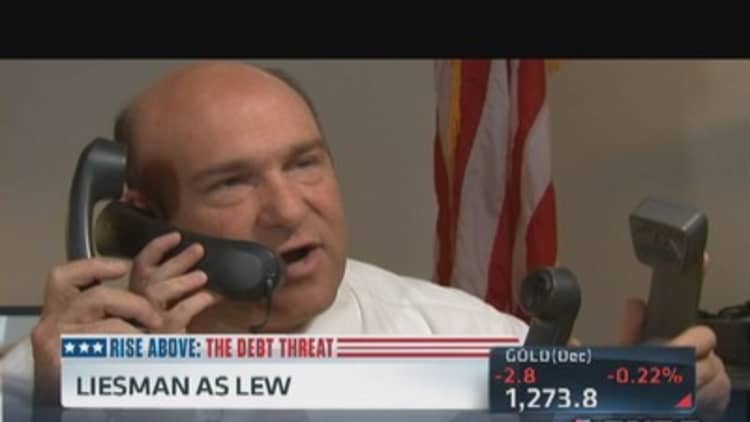At first glance, it appears the dual-track House and Senate bills to reopen the government and raise the debt ceiling make an economy-crushing debt default more likely. A White House official suggested as much Tuesday morning, saying the House bill "brings us closer to default."
But it's not necessarily so.
The two bills are not actually very far apart on substance.
The House bill, described to GOP members Tuesday morning, includes a two-year delay in the medical device tax that provides $30 billion in annual revenue to Obamacare. The Senate plan does not include that provision. But many Democratic senators are already on record in opposition to the medical device tax and the White House has made clear it's not central to the health-care law.
(Read more: Damage unfolds as default deadline clock ticks)

The dates in both plans are the same: reopen the government until Jan. 15 and lift the debt limit until Feb. 7. The House would restrict the Treasury Department's ability to engage in "extraordinary measures" to push the debt limit deadline back past Feb. 7. The administration opposes that measure but it's not clear that it's a deal-breaker. The Treasury declined to comment on this provision.
The real stumbling block appears to be the White House desire not to have the House GOP dictate terms of the end of the shutdown and debt limit fight. Doing so could enshrine a precedent in which tea party Republicans get to dictate policy changes in return for future debt limit hikes and funding resolutions.
That was the clear position in the official White House statement on the House Republican effort from spokeswoman Amy Brundage.
"The President has said repeatedly that Members of Congress don't get to demand ransom for fulfilling their basic responsibilities to pass a budget and pay the nation's bills," Brundage said. "Unfortunately, the latest proposal from House Republicans does just that in a partisan attempt to appease a small group of Tea Party Republicans who forced the government shutdown in the first place. Democrats and Republicans in the Senate have been working in a bipartisan, good-faith effort to end the manufactured crises that have already harmed American families and business owners."
(Read more: Sen. Reid: US could be downgraded Tuesday night)
Clearly the White House wants this standoff to end with a peace brokered by Senate Majority Leader Harry Reid, D-Nev., and Minority Leader Mitch McConnell, R-Ky., that includes some give from both sides. And the administration does not view the House GOP offer as giving up anything even though they have moved far off their initial demands to defund Obamacare.
So what happens now?

It's not entirely clear the House will be able to pass its own debt limit bill. If it does not, and the Senate bill is not filibustered by Sen. Ted Cruz, R-Texas, or anyone else, then it could get to the House floor by Thursday and Speaker John Boehner, R-Ohio, would almost certainly have to allow a vote to forestall default.
If the House bill gets to the Senate, Reid may try and strip out the medical device provision and another provision removing health-care subsidies for federal staff and members of Congress and send the bill back to the House.
This could push past the Thursday deadline but as long as there is a fairly clear path to final passage of a debt limit hike there should not be a huge reaction in the markets. Treasury will still have around $30 billion cash on hand and the big bills for Social Security and existing debt interest do not start coming due until November.
(Read more: Could a shaky market get the debt ceiling raised?)
There are certainly scenarios in which no debt ceiling bill can pass both houses of Congress and the United States goes into real sustained default on existing obligations. But there are far more likely scenarios in which we narrowly avoid total disaster once again and come back to fight in January.
—By Ben White, POLITICO's chief economic correspondent and a CNBC contributor. White also authors the daily tip sheet POLITICO Morning Money [politico.com/morningmoney] Follow him on Twitter @morningmoneyben.


